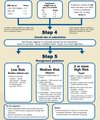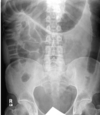12 - Gastroenterology Flashcards
What are some causes of diarrhoea?

How do most patients with IBD present initially, and how do you take a history of this presenting system?
Change in bowel habit
- How often and is this different from usual?
- Has the form changed?
- Any blood?
- Tenesmus?
- Faecal urgency or incontinence?
- Do they easily flush?
- Waking in night to defecate?

What are the differences between Crohn’s and UC?
- Crohn’s has perianal disease but UC does not
- Crohn’s often non-bloody but UC is bloody
- Crohn’s has skip lesions but UC constant
- Crohn’s is transmural but UC superficial
- Crohn’s has granulmoas but UC has crypt abscesses
- Crohn’s worsened by smoking but UC smoking is protective

If a patient presents with change in bowel habit, what are some investigations you should do and what might they show?
- Blood Tests (FBC, ESR, CRP)
- Stool Tests (to exclude infective causes)
- Faecal Calprotectin
- AXR
- Endoscopy
- CT/MRI

If a patient presents with an IBD flare, you do an AXR and flexi sig, what do they show?
AXR: proximal constipation and assess for toxic megacolon
Flexi Sig: inflammation, safer than colonoscopy
What are some of the symptoms and signs of UC?
Symptoms:
- Episodic or chronic diarrhoea
- Mucus or bloody stools
- Crampy abdominal pain
- Tenesmus due to proctitis
Signs: fever and tender distended abdomen if acute, clubbing, oral ulcers, erythema nodosum

How do you assess the severity of UC?
Truelove and Witt’s Criteria

What are some of the complications with UC?
Acute:
- Toxic megacolon with risk of perforation
- VTE
- Low K+
Chronic:
- Colon cancer (surveillance colonoscopy with multiple random biopsies)

How is chronic UC managed?

Goals are to induce then maintain remission
GIVE BONE PROTECTION AS IBD AND STEROIDS RISK FOR OSTEOPOROSIS
1st Line: Mesalazine (5-ASA) for induction/remission
2nd Line: Azathioprine and Biologics

How is acute UC managed?
(use image)
- Prophylactic heparin as high VTE risk
- Steroids (usually IV hydrocortisone but can have oral/rectal) to induce
- Rescue therapy if not responding in 3-5 days is ciclosporin, biologics or surgery (colectomy)

What monitoring is needed for acute UC treatments as immunosuppressants are used in the treatment?
- FBC
- U+Es
- LFTs
What surgery is done for UC patients?
Subtotal colectomy and terminal ileostomy if failure of medical therapy or toxic megacolon

What are some of the signs and symptoms of Crohn’s?
Symptoms:
- Diarrhoea
- Abdominal pain
- Weight loss
- Fatigue, fever, malaise
Signs: bowel ulceration on colonoscopy, perianal abscess, skin tags, fistulas, skin and eye problems

What can exacerbate Crohn’s?
- Smoking
- NSAIDs
What are some complications with Crohn’s?
- SBO
- Toxic megacolon
- Abscess fromation
- Fistulae e.g entero-enteric, colovesical
- Colon cancer
- Malnutrition
- Perianal disease

What investigations should you do if you suspect Crohn’s?
- Bloods: FBC, U+Es, ESR, CRP, B12, Folate, Ferritin
- Stool culture: exclude E.Coli, Shigella, Campylobacter
- Colonoscopy and biopsy
- Capsule endoscopy
- MRI
How is chronic Crohn’s managed?
- Quit smoking and optimise nutrition
- 1st Line: Oral steroids (prednisolone) to induce
- 2nd Line: Azathioprine if relapsing on steroid taper or Biologics like Anti-TNFa
- 3rd Line: Surgery to either resect affected areas, or control perianal disease

How is acute Crohn’s managed?
- IV hydration/eclectrolytes
- IV hydrocortisone
- VTE prophylaxis
- Consider nutritional support
What is the mainstay of treatment for acute IBD?
- Prophylactic IV heparin
- Steroids
What is the first choice medication for perianal disease or fistulating disease in Crohn’s?
Biologics like anti-TNFa then surgery
What are some side effects of Azathioprine and Infliximab used in Crohn’s treatment?
Azathioprine (monitor FBC, U+Es, LFTs): abdominal pain, hepatitis, pancreatitis, leucopenia
Infliximab (check CXR and IGRA for TB): lymphoma risk, reactivate TB,
What are some of the side effects of Mesalazine (5ASA)?
Decreases risk of colorectal cancer but:
- diarrhoea
- headache
- nausea & rash
- interstitial nephritis
What is the pathophysiology of coeliac disease?
Autoimmune condition where T cells react to the gliadin fraction of gluten and cause villous atrophy in the small bowel and malabsorption

When should you suspect coeliac disease?
- Diarrhoea with weight loss and iron deficiency/B12 anaemia
- FHx in first degree relative














































